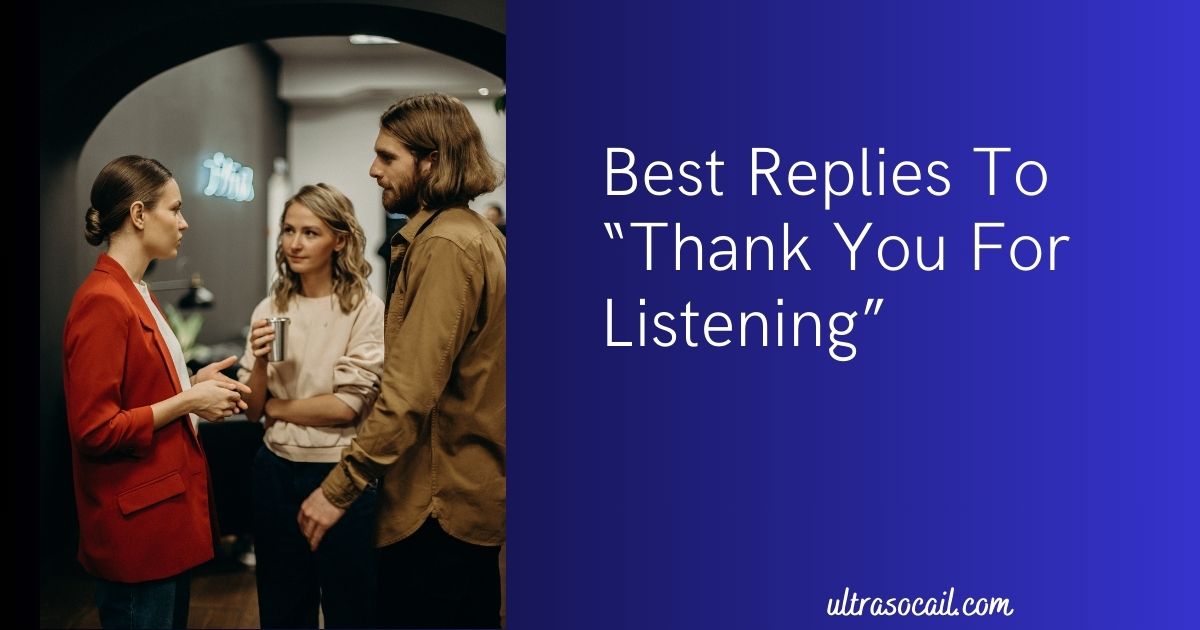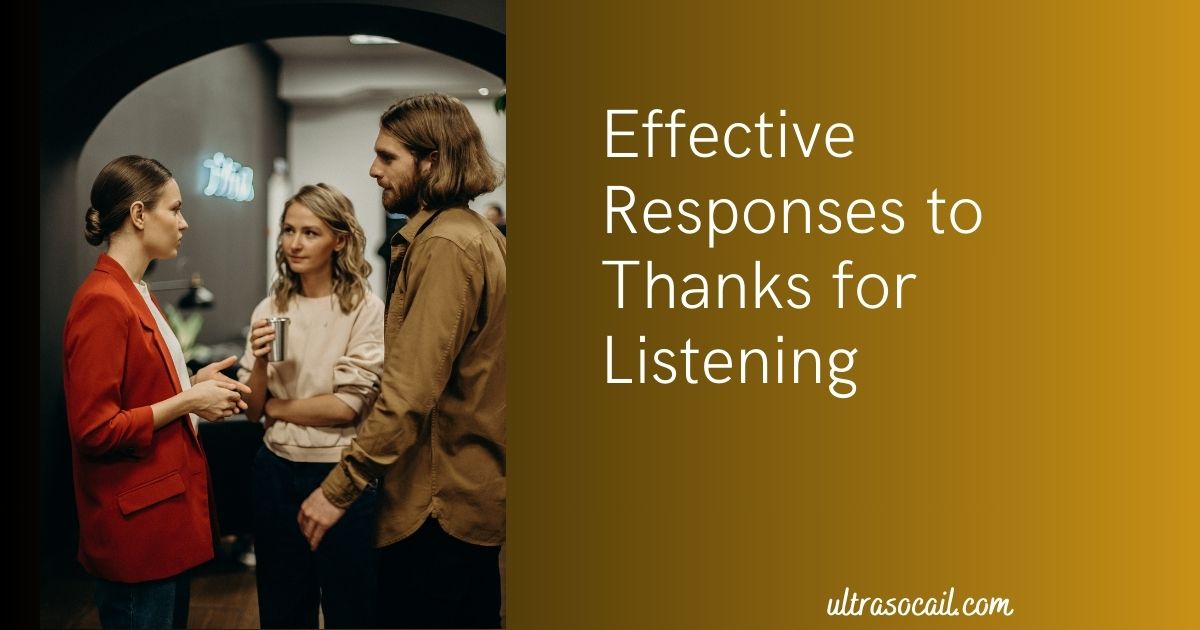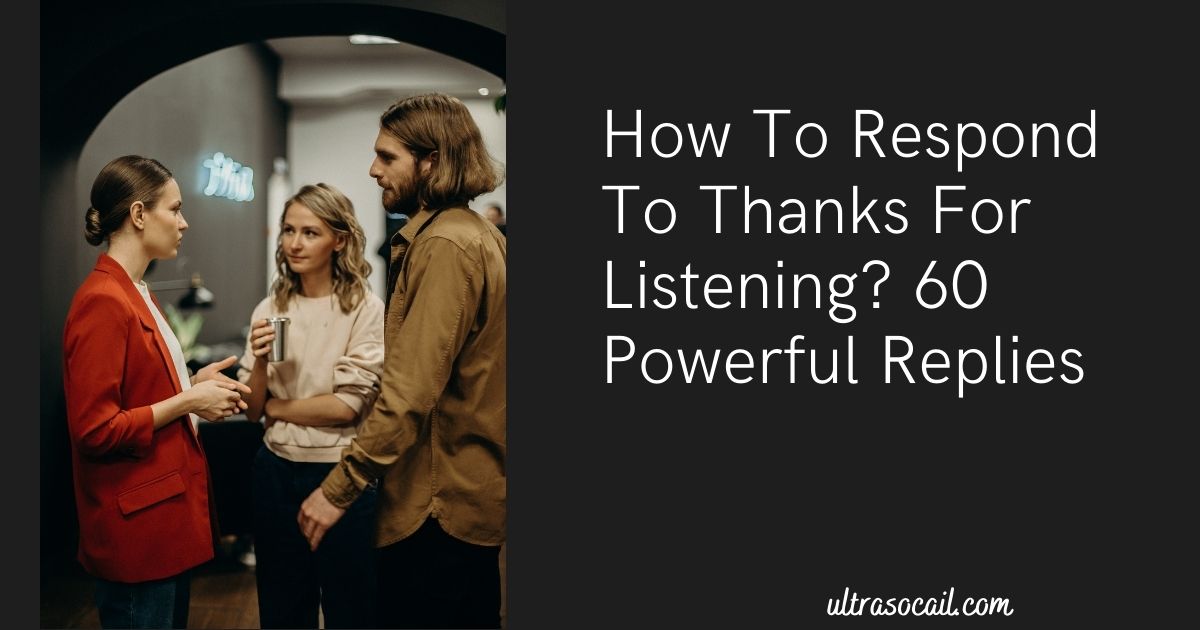When someone says, Thank you for listening, it’s not just a polite gesture; it’s a heartfelt acknowledgment of your effort to connect.
Your response carries the power to deepen that bond and show that you genuinely value their feelings. Think about it:
how you reply can transform a simple moment into a meaningful conversation. Using thoughtful responses to thanks for listening can make a big difference. Imagine saying, I really appreciate you sharing that with me.
This response shows empathy and reinforces your active listening skills. Engaging in meaningful responses to thanks for listening helps cultivate trust and fosters supportive communication. Every reply counts!
By creating an inviting atmosphere for dialogue, your responses to thanks for listening can turn a casual thank you into a rich exchange of ideas and emotions.
Embrace these responses to thanks for listening to elevate your communication skills and strengthen important relationships.
Best Replies To “Thank You For Listening”

Responses to thanks for listening can truly enhance your conversations. Thoughtful replies not only acknowledge gratitude but also strengthen connections. Discover the best responses to thanks for listening that foster deeper communication and empathy.
1. Anytime! I’m always here for you.
This response reassures the other person that you are always available. It shows your commitment to being a supportive friend or colleague.
Example:
Friend: “Thanks for listening to me vent.”
You: “Anytime! I’m always here for you.”
2. I’m glad I could help.
This reply conveys your happiness in being able to assist someone. It highlights your desire to be supportive and engaged.
Example:
Co-worker: “thank you for listening to us.”
You: “I’m glad I could help.”
3. It was my pleasure.
Using this response shows that you genuinely enjoyed listening. It expresses your willingness to offer your time and attention.
Example:
Friend: “Thank you for being there.”
You: “It was my pleasure.”
4. I value your thoughts.
This response emphasizes the importance of the other person’s opinions. It fosters an environment of mutual respect and understanding.
Example:
Colleague: “Thanks for hearing me out.”
You: “I value your thoughts.”
5. Your story really touched me.
This reply shows emotional engagement and compassion. It reinforces your connection through shared experiences.
Example:
Friend: “Thanks for listening to my struggles.”
You: “Your story really touched me.”
6. I appreciate your trust.
This response highlights the importance of trust in communication. It acknowledges the vulnerability involved in sharing personal feelings.
Example:
Colleague: “Thank you for being so understanding.”
You: “I appreciate your trust.”
7. It’s important to me to be there for you.
This reply reinforces your commitment to the other person’s well-being. It demonstrates that you genuinely care about their feelings.
Example:
Friend: “Thanks for listening to me.”
You: “It’s important to me to be there for you.”
8. Listening is the least I could do.
This response humbly expresses that being a good listener is a simple yet meaningful act. It shows your dedication to supporting them.
Example:
Colleague: “Thanks for hearing me out.”
You: “Listening is the least I could do.”
9. Your perspective is valuable.
This reply acknowledges the worth of the other person’s insights. It encourages them to continue sharing their thoughts and feelings.
Example:
Friend: “Thanks for listening to my opinions.”
You: “Your perspective is valuable.”
10. Happy to lend an ear.
This response conveys your readiness to listen. It assures the other person that they can always count on your support.
Example:
Colleague: “Thanks for taking the time to listen.”
You: “Happy to lend an ear.”
11. I’m here whenever you need to talk.
This response emphasizes your availability and willingness to engage in conversation whenever needed.
Example:
Friend: “Thanks for your support.”
You: “I’m here whenever you need to talk.”
12. Your gratitude means a lot to me.
This reply highlights the importance of their appreciation. It reinforces a positive connection and encourages open communication.
Example:
Colleague: “Thank you for being there.”
You: “Your gratitude means a lot to me.”
13. I’m glad you felt comfortable sharing.
This response expresses relief and happiness that the other person felt safe to open up. It strengthens the bond between you.
Example:
Friend: “Thanks for listening to my worries.”
You: “I’m glad you felt comfortable sharing.”
14. Your insights are always helpful.
This response shows that you value their input. It encourages them to continue sharing their thoughts in the future.
Example:
Colleague: “Thanks for listening to my ideas.”
You: “Your insights are always helpful.”
15. I appreciate you sharing your story.
This reply acknowledges the effort it takes to open up. It shows gratitude for their willingness to share personal experiences.
Example:
Friend: “Thanks for hearing me out.”
You: “I appreciate you sharing your story.”
16. I’m always here to listen.
This response reaffirms your commitment to being a supportive listener. It offers reassurance that they can always reach out.
Example:
Colleague: “Thank you for your support.”
You: “I’m always here to listen.”
17. I’m glad we could talk.
This reply expresses happiness about the conversation. It shows that you value the time spent discussing important matters.
Example:
Friend: “Thanks for listening today.”
You: “I’m glad we could talk.”
18. Your feedback is crucial.
This response emphasizes the importance of their opinions. It encourages open communication and values their insights.
Example:
Colleague: “Thanks for taking the time.”
You: “Your feedback is crucial.”
19. It means a lot to me that you trust me.
This reply acknowledges the significance of trust in your relationship. It strengthens the bond between you.
Example:
Friend: “Thank you for listening.”
You: “It means a lot to me that you trust me.”
20. I’m here for you, always.
This response reassures the other person of your constant support. It emphasizes your commitment to being there for them.
Example:
Colleague: “Thanks for being a good listener.”
You: “I’m here for you, always.”
21. You can count on me.
This reply emphasizes your reliability. It reassures the other person that they can trust you for support.
Example:
Friend: “Thanks for your support.”
You: “You can count on me.”
22. Your feelings matter to me.
This response validates the other person’s emotions. It shows empathy and strengthens your connection.
Example:
Colleague: “Thanks for understanding.”
You: “Your feelings matter to me.”
23. I’m grateful for your openness.
This reply acknowledges the vulnerability involved in sharing. It encourages continued honesty in your conversations.
Example:
Friend: “Thanks for listening to my thoughts.”
You: “I’m grateful for your openness.”
24. I’m happy to support you.
This response shows your willingness to be there for the other person. It reinforces your commitment to their well-being.
Example:
Colleague: “Thanks for your help.”
You: “I’m happy to support you.”
25. Your words are important.
This reply emphasizes the significance of their thoughts. It encourages them to continue expressing themselves.
Example:
Friend: “Thank you for listening to me.”
You: “Your words are important.”
26. I’m here to help.
This response reiterates your willingness to assist. It shows that you are ready to provide support whenever needed.
Example:
Colleague: “Thanks for being there.”
You: “I’m here to help.”
27. It was good to hear your perspective.
This reply acknowledges the value of their insights. It encourages further discussion and shows appreciation for their thoughts.
Example:
Friend: “Thanks for listening to my views.”
You: “It was good to hear your perspective.”
28. I’m honored you confided in me.
This response conveys appreciation for their trust. It emphasizes the significance of their willingness to share personal thoughts.
Example:
Colleague: “Thanks for being so supportive.”
You: “I’m honored you confided in me.”
29. Your trust means everything.
This reply highlights the importance of trust in your relationship. It reinforces a positive connection and mutual respect.
Example:
Friend: “Thanks for being a good listener.”
You: “Your trust means everything.”
30. I’m glad I could be here for you.
This response expresses gratitude for the opportunity to listen. It reinforces your commitment to being supportive.
Example:
Colleague: “Thank you for your time.”
You: “I’m glad I could be here for you.”
31. I’m happy to listen anytime.
This response expresses your willingness to be available for future conversations. It reassures the other person that they can reach out to you whenever they need support. This commitment fosters a sense of safety and trust in your relationship.
Example:
Friend: “Thanks for being there for me.”
You: “I’m happy to listen anytime.”
32. I’m here to support you.
This reply emphasizes your readiness to provide help and encouragement. It shows that you genuinely care about the other person’s well-being. Acknowledging your support can strengthen your bond and encourage openness.
Example:
Colleague: “Thanks for your help today.”
You: “I’m here to support you.”
33. Your trust is appreciated.
This response acknowledges the importance of the trust they place in you. It shows that you value their willingness to share personal thoughts. Recognizing their trust can deepen your connection and encourage future conversations.
Example:
Friend: “Thank you for listening.”
You: “Your trust is appreciated.”
34. I admire your courage in sharing.
This reply emphasizes the bravery it takes to open up about personal experiences. It shows that you recognize their vulnerability and appreciate their honesty. Acknowledging their courage can encourage them to share more in the future.
Example:
Colleague: “Thanks for being so understanding.”
You: “I admire your courage in sharing.”
35. I value our conversations.
This response highlights the importance of your discussions and the connection you share. It shows gratitude for their willingness to communicate openly. Recognizing the value of your conversations can deepen your relationship.
Example:
Friend: “Thanks for listening to my thoughts.”
You: “I value our conversations.”
36. Your experiences matter to me.
This reply acknowledges the significance of their life experiences and feelings. It shows that you are genuinely interested in their story. Validating their experiences can foster a deeper understanding between you.
Example:
Colleague: “Thank you for hearing me out.”
You: “Your experiences matter to me.”
37. I’m glad we had this talk.
This response expresses satisfaction with the conversation you just had. It shows that you value the time spent together and encourages future discussions. Acknowledging the importance of the talk can strengthen your bond.
Example:
Friend: “Thanks for listening to my concerns.”
You: “I’m glad we had this talk.”
38.Your feelings are valid.
This reply affirms the legitimacy of their emotions and shows that you respect their feelings. It encourages them to express themselves more freely. Validating their emotions can enhance trust and connection in your relationship. Thoughtful responses to thanks for listening can go a long way.
Example:
Colleague: “Thanks for being supportive.”
You: “Your feelings are valid.”
39.I appreciate your willingness to share.
This response acknowledges their effort to open up and communicate. It shows gratitude for their honesty and encourages further sharing. Recognizing their willingness can create a safe space for future conversations. These responses to thanks for listening are essential for building rapport.
Example:
Friend: “Thank you for listening to me.”
You: “I appreciate your willingness to share.”
40.I’m here to hear you out.
This reply emphasizes your commitment to listening and understanding. It shows that you are ready to provide support whenever they need it. Acknowledging your willingness to listen can foster a deeper connection. Responses to thanks for listening help solidify your role as a supportive friend.
Example:
Colleague: “Thanks for taking the time to listen.”
You: “I’m here to hear you out.”
41.Your insights mean a lot.
This response acknowledges the value of their thoughts and opinions. It shows that you appreciate their perspective and encourages them to share more. Recognizing their insights can foster deeper and more meaningful conversations. Effective responses to thanks for listening show you care.
Example:
Friend: “Thanks for listening to my ideas.”
You: “Your insights mean a lot.”
42.I’m grateful for your honesty.
This reply emphasizes your appreciation for their openness in sharing. It shows that you value their sincerity and encourages further dialogue. Acknowledging their honesty can strengthen trust in your relationship. Thoughtful responses to thanks for listening can deepen bonds.
Example:
Colleague: “Thank you for being so straightforward.”
You: “I’m grateful for your honesty.”
43.I’m always here to lend an ear.
This response highlights your commitment to being there for them whenever they need support. It shows that you care about their feelings and are willing to listen. Reassuring them of your presence can create a strong sense of connection. Remember, good responses to thanks for listening matter.
Example:
Friend: “Thanks for always being supportive.”
You: “I’m always here to lend an ear.”
44.Your story is important to me.
This reply emphasizes that you value their narrative and the experiences they’ve shared. It shows that you recognize the significance of their journey. Acknowledging the importance of their story can encourage them to open up even more. Responses to thanks for listening can validate their experiences.
Example:
Colleague: “Thank you for listening to my challenges.”
You: “Your story is important to me.”
45.I’m glad we could connect.
This response expresses appreciation for the opportunity to communicate and share thoughts. It shows that you value the connection and are open to more discussions. Acknowledging the connection can deepen your relationship. Meaningful responses to thanks for listening enhance mutual understanding.
Example:
Friend: “Thanks for hearing me out.”
You: “I’m glad we could connect.”
Related Guide:
How To Respond To What’s Cookin Good Lookin: 50+ Replies
What does it mean when someone says “thank you for listening to me”?
When someone says “thank you for listening to me,” it shows they appreciate your attention. This phrase indicates that they feel heard and valued. Your responses to thanks for listening can strengthen your bond. Acknowledging their gratitude encourages open communication.
Understanding the meaning behind their words is essential. Responses to thanks for listening can include simple affirmations like “I’m here for you.” These replies not only show empathy but also invite deeper conversations. Your thoughtful responses to thanks for listening create a supportive environment where they feel comfortable sharing.
Effective Responses to Thanks for Listening

In any conversation, how you respond to gratitude matters. Effective responses to thanks for listening can strengthen your connections. Here are some impactful replies to enhance your communication skills.
1.I’m happy to be here for you.
This response emphasizes your willingness to provide support, reinforcing the bond between you and the speaker.
Example:
Friend: “Thanks for your time.”
You: “I’m happy to be here for you.”
2.I value our conversation.
This reply shows that you appreciate the discussion and the speaker’s perspective, encouraging them to share more.
Example:
Colleague: “Thanks for hearing me out.”
You: “I value our conversation.”
3.Your thoughts are important to me.
This response validates the speaker’s opinions, making them feel heard and respected.
Example:
Friend: “Thank you for listening to my concerns.”
You: “Your thoughts are important to me.”
4.I appreciate your openness.
This response acknowledges the courage it takes to share personal feelings, fostering a safe space for dialogue.
Example:
Colleague: “Thanks for being so understanding.”
You: “I appreciate your openness.”
5.You can always count on me.
This reply reassures the speaker of your ongoing support, enhancing trust in your relationship.
Example:
Friend: “Thanks for always being there.”
You: “You can always count on me.”
6.I’m glad you felt comfortable sharing.
This response recognizes their vulnerability and encourages further honest communication.
Example:
Colleague: “Thanks for listening to my ideas.”
You: “I’m glad you felt comfortable sharing.”
7.Your feelings are heard.
This reply emphasizes that you genuinely understand their emotions, reinforcing your empathetic listening skills.
Example:
Friend: “Thank you for your support.”
You: “Your feelings are heard.”
8.I appreciate your perspective.
This response acknowledges the uniqueness of their viewpoint, encouraging more open dialogue.
Example:
Colleague: “Thanks for taking the time.”
You: “I appreciate your perspective.”
9.It’s always great to talk with you.
This reply shows that you enjoy the conversations, making them feel valued and appreciated.
Example:
Friend: “Thanks for listening.”
You: “It’s always great to talk with you.”
10.Your voice matters.
This response emphasizes the significance of their opinions, motivating them to continue sharing.
Example:
Colleague: “Thanks for your feedback.”
You: “Your voice matters.”
11.I’m here for you anytime.
This reply reassures them that they can reach out to you whenever they need support.
Example:
Friend: “Thanks for your kindness.”
You: “I’m here for you anytime.”
12.Your story is valuable.
This response acknowledges the importance of their experiences and encourages them to share more.
Example:
Colleague: “Thank you for listening to my journey.”
You: “Your story is valuable.”
13.It means a lot that you trust me.
This reply reinforces the trust between you and the speaker, encouraging more candid discussions.
Example:
Friend: “Thanks for being a great listener.”
You: “It means a lot that you trust me.”
14.You’re doing great by sharing.
This response encourages the speaker by recognizing their effort to express themselves.
Example:
Colleague: “Thanks for understanding my challenges.”
You: “You’re doing great by sharing.”
15.I’m always interested in what you have to say.
This reply shows that you value their contributions, fostering a positive communication environment.
Example:
Friend: “Thanks for hearing me out.”
You: “I’m always interested in what you have to say.”
FAQ’S
How do you reply to “thank you for listening”?
You can say, “I’m glad I could help.” This is a simple and sincere response. Using effective responses to thanks for listening strengthens your connection.
How do you respond to listening?
A good response is, “I appreciate you sharing your thoughts.” This shows you value their feelings. Thoughtful responses to thanks for listening enhance your communication.
How do you thank someone for listening?
You can say, “Thank you for taking the time to hear me out.” This expresses gratitude for their attention. Such responses to thanks for listening create a supportive environment.
How do you respond to thanks professionally?
In a professional setting, you might say, “I value your insights.” This shows respect for their contributions. Professional responses to thanks for listening build strong relationships.
How do you humbly respond to thank you?
A humble response could be, “I’m just glad I could be here for you.” This acknowledges their gratitude without boasting. Humble responses to thanks for listening promote deeper connections.
Conclusion
The importance of responses to thanks for listening cannot be overstated. These responses create a connection and show that you genuinely value what the other person has shared. By practicing effective responses to thanks for listening, you enhance communication skills and build trust in your relationships. Always remember, thoughtful responses to thanks for listening encourage open dialogue.
Whether it’s a simple acknowledgment or a more in-depth reply, your words can make a difference. The way you respond to thanks for listening can lead to deeper conversations and strengthen bonds. Keep honing your skills in providing meaningful responses to thanks for listening, and you’ll foster a supportive and understanding environment in your personal and professional life. Embrace the power of responses to thanks for listening and watch your connections flourish.

As a seasoned content writer with five years of experience, I specialize in crafting engaging and SEO-friendly website content that resonates with audiences. My passion lies in transforming complex ideas into clear, compelling narratives that drive traffic and conversions. With a keen eye for detail and a deep understanding of digital marketing, I help brands tell their stories effectively. Whether it’s blog posts, web copy, or social media content, I strive to deliver quality that captivates readers and enhances online presence.







